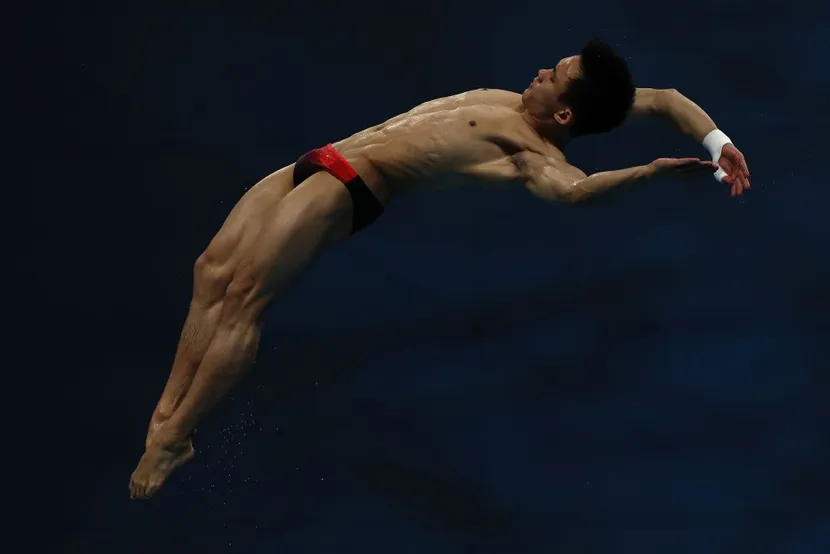All 13 diving gold medals went to China, but the final one almost didn’t happen
All 13 diving gold medals went to China, but the final one almost didn’t happen. Yang Jian and Yang Hao had the opportunity to accomplish a clean sweep of the global diving championships after China dominated the field in 12 diving competitions.
China had one more opportunity on the final day of the FINA World Championships, which also happened to be the final day of diving, to accomplish a feat that no country had ever achieved: win 13 gold medals in a single discipline. China was just six dives away after capturing gold No. 12 in the women’s 3-meter synchro event earlier on Sunday. Yang Jian or Yang Hao would have the last say. They had jointly won this Budapest 10m synchro event. The men’s 10-meter platform event had to be won, though, therefore one of them had to do it now.
Pic Source- https://www.fina.org/news/2666325/china-wins-all-13-diving-golds-but-the-last-one-almost-slipped-away
The reigning world champion was 28-year-old Yang Jian. He also has the harder dive list. He was reserving the hardest dive for last, which had degrees of difficulty of 3.8 and 4.1 on Dives 3 and 6. Yang Hao, his 24-year-old gold-medal synchro partner, also had high goals. The Japanese adolescent Rikuto Tamai, 15, and the Ukrainian star Oleksii Sereda, who won two fourth-place finishes at the 2019 world championships at the age of 13, were just behind them. Rikuto Tamai also placed sixth twice on the 10-meter platform at the Tokyo Olympics when he was 15 years old.
Yang and Yang were in the top 3 following two dives. However, the third round seismically changed the competition’s atmosphere. The current champion, Yang Jian, blew his 5156B (triple twisting forward 212), the dive with the 3.8 DD. With a score of 66.50, he dropped from second to seventh place and lagged Japan’s Tamai by 18.1 points in the standings. Later, Yang Hao scored 64.75 points after blowing his 407B (inward 312), falling from first to third.
After dive four, Tamai kept the advantage. However, Yang Hao came back and cut Tamai’s lead to just a single point. By performing an armstand back double with two and a half twists, Yang Jian was able to move up from seventh to third.
The scoreboard was again jumbled after round five. With around 10 points more than Australian Cassiel Rousseau, Yang Jian unexpectedly regained the lead. Just 3.1 points separated Rousseau from Yang Hao in third place. Tamai fell to fourth on a simpler dive.
Tamai, Yang Jian, and Yang Hao were the final three men to dive. Tamai made sure he would leave Budapest with a medal by scoring 488.0 points on a 5255B that garnered marks of 9.0, 9.0, and 8.5. The destiny of the country hinged on Yang Jian’s ability to do the most challenging dive in the competition: his 4.1 DD. He was successful, or at least successful enough to get 102.50 points (based on 8.5, 8.5, and 8.0 from the judges) and beat Tamai to a practically obscene 515.55 point. Thus, it was finished. Yang Hao was able to breathe out and win the bronze, which he did, with a powerful forward 412.
‘It’s fortunate that we [China] receive the gold and bronze medal,’ said Yang Jian, the gold medallist, after the competition. Yang Jian stated, ‘It’s pressure. I acknowledge the difficult path I walked to achieve gold. I nevertheless succeeded. The pressure didn’t get to me. The women’s 3m synchro event, which was held right before, virtually devolved into an undercard in comparison to the unanticipated drama of the men’s 10m final.’
Chen Yiwen paired up with the 3-meter bronze medalist from last night to once again dominate all five rounds on way to victory, extending China’s dominance less than 24 hours after they added the women’s 3-meter gold medal to their collection. China won all five of the women’s events at the 19th FINA World Championships for gold, and their 343.14-point victory made that happen.
The judges gave China many 9.0s, including 20 (out of 25) for synchronization, even though no perfect 10s were given during the competition. The athletes were ecstatic following the event. The diving here was incredible, exclaimed Chang, 21. ‘The audience was entertaining,’ we would want to express our gratitude to them for providing us with a great deal of energy and electricity.
In less than a day after adding to China’s dominance by capturing the women’s 3-meter gold, Chen Yiwen paired up with the 3-meter bronze medalist from the previous evening to once again dominate all five rounds en route to triumph. China won all five of the women’s events at the 19th FINA World Championships, taking home five gold medals, for a total of 343.14 points.
China received many 9.0s from the judges, including 20 (out of 25) for synchronization, even though no perfect 10s were given during the competition. The athletes were jubilant following the contest. Chang, a 21-year-old, gushed, ‘The diving here was great! The crowd was entertaining. We’d want to thank them and express our gratitude for all the energy and strength they offered us.’
But Australia nearly took it away. After four dives, Japan was just one point behind Maddison Keeney, 26, and Anabelle Smith, 29. They failed to advance on their fifth and final dive, a 5152B (forward-twisting 212), and won the bronze medal, falling 8.88 points short of Japan. Keeney and Smith also won the bronze medal in this competition at the 2016 Summer Olympics in Rio.
In the 12-nation final, the US, Malaysia, Canada, and Germany came in fourth through eighth. With the exception of the discipline’s 1998 debut, China has now won the women’s 3m synchro event 12 out of the last 13 times it has been held at the world championships.

